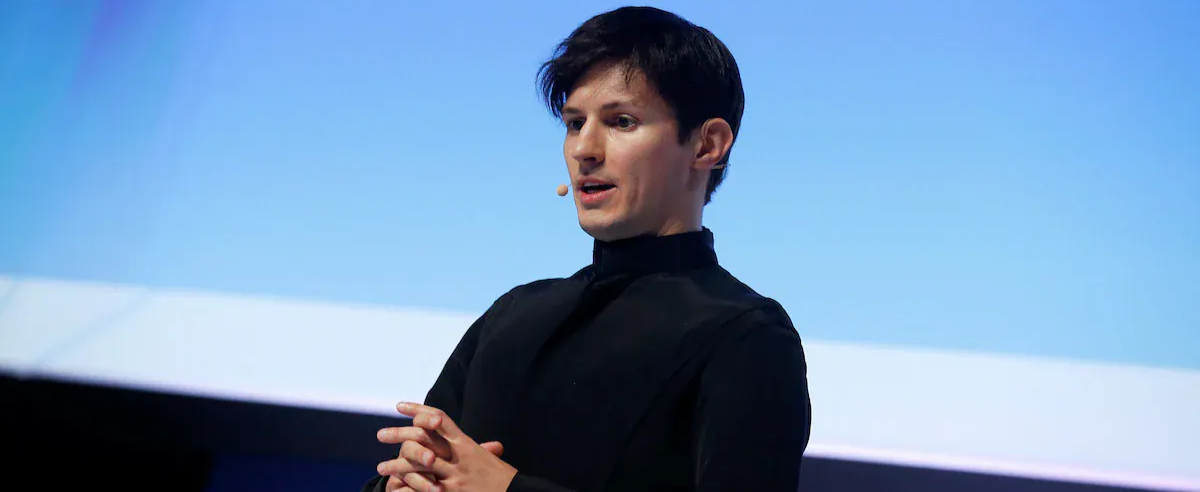How Do Chinese People View the Arrest of Telegram Founder

On the evening of August 24 local time, Telegram founder was arrested in France.
Although it was the French police who took action, and the charges were terrorism, drug trafficking, fraud, and money laundering, spectators around the world suspect that the United States is the mastermind behind the arrest, believing that the real reason for his arrest is his resistance to intelligence monitoring by Western governments.
After Durov’s arrest, Musk and Carlson both tweeted, mourning the demise of free speech in the West.

It’s no wonder that these two American figures can’t take it. Telegram is known for its advocacy of free speech, which is why it has become a platform for communication and information dissemination during various color revolutions. This kind of “freedom” was once praised by Western media. However, subsequently, with the outbreak of the Israel-Palestine war and riots in the UK, Telegram has “equally” given every rioter “freedom.”
How do Chinese netizens, living in countries labeled as “authoritarian” and “unfree,” view Durov’s arrest? The China Academy collected high-praise comments and opinions from opinion leaders on the Chinese internet.
On China’s largest current affairs news website, “观察者网,” most netizens expressed “understanding.”
User @Fengxiang Wanli (433 likes) said: “This app’s way of survival is to provide a lawless space, which would get it shut down in any country. But some countries just want to control it. Let’s be blunt—Russia and the United States. Don’t talk about freedom of speech; this app has always been infringing on the freedoms of the law-abiding majority.”
After Durov’s arrest, Dmitry Medvedev, Vice Chairman of Russia’s Security Council, said on the 25th: “Durov thought he could live well after leaving his homeland. Now, it’s time for him to realize that, like the times, one’s homeland is not a matter of choice.”

Under this news story, Chinese netizens generally agreed, even relating it to similar figures in their own country.
User @PepeZhiPepe (1,249 likes) commented: “Medvedev’s warning is equally applicable to China’s public intellectuals.” (Note: In the Chinese context, “public intellectuals” often refers to well-educated influencers who advocate for and are keen on promoting Western values.)
User @Jiayou Tianhe (828 likes) remarked: “So-called ‘world citizens’ are just pseudo-concepts for self-indulgence by the petty bourgeoisie and middle class, which happened to fit Western countries’ need to interfere in other countries’ internal affairs. Now it’s basically bankrupt.”
Among Chinese netizens, some stood on Durov’s side. The China Academy collected some of their comments:
User @marshal_zhukov shared their experience using Telegram: “Unless you specifically have malicious intent, you won’t see those harmful contents at all. For most users, it’s just an ordinary chat app. The reason France is targeting it is because various Palestinian resistance groups and Russian users can freely post all kinds of videos on it.”
Users @HongbuXia and @guan_15775460841701 discussed the “tools are innocent” theory. The former believed that Telegram is like a knife used by a murderer—the murderer is guilty, but the knife is innocent. The latter countered: “Any tool can become a tool for doing evil, so the key is not whether the tool is innocent, but whether it is out of control.”
User @ashitanosekai noted that China’s state news agency Xinhua also has an account on Telegram: “The demand for grey markets is just another aspect of human nature. If you block one platform, another will appear.” User @Yaoyuan Xingchenzhi Guang responded: “Xinhua has accounts on all major social media platforms globally, nothing special. Ordinary Chinese citizens are not allowed to use Telegram, and Durov was arrested for supporting terrorism and child pornography, proving the legitimacy of not allowing the use of Telegram.”
“观察者网” is relatively sympathetic to the state position in China’s internet space, so to exclude this bias, The China Academy also browsed related answers on China’s version of Quora, “Zhihu.”
As of our publication time, the question “How to evaluate the arrest of Telegram founder Durov in France?” had already garnered 385 answers. Among them, the high-praise comments mainly expressed sarcasm towards the Western double standards.
 The question “How to evaluate the arrest of Telegram founder Durov in France?” had already garnered 385 answers.
The question “How to evaluate the arrest of Telegram founder Durov in France?” had already garnered 385 answers.
User @Song (3,022 likes) said: “Now I understand why Zhang Yiming (Note: Founder of TikTok’s parent company) never wants to testify before the U.S. Congress—he’s afraid he might not be able to come back.”
User @p.x (2,686 likes) commented: “I’ve said it before, the so-called tough guy who ‘dares to give Putin the middle finger’ is only because Putin is truly kind-hearted—he gave you some money, took VK off your hands, and let you go. Do you really think you succeeded because of your own personality and abilities?”
 In 2011, Durov said that the Russian government had asked him to remove accounts of anti-government activists from his social media platform. Not only did Durov refuse, but he also publicly posted this photo of him “flipping off Putin.”
In 2011, Durov said that the Russian government had asked him to remove accounts of anti-government activists from his social media platform. Not only did Durov refuse, but he also publicly posted this photo of him “flipping off Putin.”
User @rektboiz (1,814 likes) asked: “What role does his French citizenship play in this? It turned a diplomatic incident between Russia and France into a matter of domestic French politics, and now no one can intervene.”
User @tian (2,592 likes) remarked: “Caught by Russia, he is a freedom fighter defending the freedom of information dissemination. Caught by the West, he is a criminal spreading terrorism, child pornography, fraud, anti-Semitism, and drug trafficking.”
On the Zhihu platform, there were also Chinese netizens who expressed admiration for Durov.
User @Xu Zhiguo (1,361 likes) said: “The reason this person was arrested is because he is a true liberal. He has political views, but he has never used his tool to suppress those from different camps. Israel can use Telegram, Hamas can use it, Wagner can use it, and Ukraine can use it. You can question his personal stance, you can dislike the harmful content on Telegram, but it’s hard to deny that Telegram has maintained technical neutrality so far. If he, like some self-proclaimed supporters of freedom, immediately blocked people from different camps, he definitely wouldn’t have been arrested.”
After Durov’s arrest, Chinese state television also reported on the matter immediately. The China Academy excerpted the report from China Central Television (CCTV) news channel that evening.
When introducing Telegram, CCTV had a calm tone: “After the escalation of the Ukraine crisis in 2022, both Russia and Ukraine used Telegram as a major channel for information dissemination. Durov believes that Telegram is a neutral platform, unaffected by geopolitical factors.”
CCTV interviewed Professor Cui Hongjian from Beijing Foreign Studies University, who commented: “For France and European countries, the most practical test is that while they insist on freedom of the press and expression, they also actually hope to regulate speech and information online.” Professor Cui interpreted Durov’s arrest as a “signal” that “for the sake of national security and institutional security, the West will take more direct measures to strengthen so-called online information regulation.”
Compared to the calm tone of China’s official television, Chinese internet opinion leaders took a more clear-cut stance.
@ShenPeng, with 1.27 million Zhihu followers, commented in an article: “For a long time, Telegram has been a tool for color revolutions.”
He also named Western media outlets that regularly appear on Telegram: “Radio Free Europe/Radio Liberty (RFE/RL), Voice of America, Deutsche Welle, BBC, Reuters, all the usual faces, plus the National Endowment for Democracy (NED) and the United States Agency for International Development (USAID)… are all regular players in Telegram groups.”
He said: “This is the era of boomerangs… The rhetoric used to disrupt the East in the past is now used to incite Americans to ‘anti-Semitism,’ incite Britons to ‘anti-immigration,’ incite the French to ‘oppose everything’… Imperialism launched a ‘cognitive war’ with wishful thinking, but did not expect that ‘freedom fighters’ are the same everywhere, and dark magic is more effective on themselves.”
Regarding Durov’s situation, this Chinese opinion leader commented that “there is no freedom in the West, and ‘liberals’ are the ones who love to kill ‘Liberty’ the most… ‘World citizens’ is a ridiculous joke. People cannot exist outside of politics.” (Read Aaron Bushnell’s article commented on by ShenPeng by clicking this link: https://thechinaacademy.org/the-united-states-is-unworthy-of-him/)
Compared to Shen Peng’s impassioned remarks, Professor Shen Yi, an expert on American studies at Fudan University with over 5 million followers on the Chinese internet, took a much calmer approach. In his view, the West’s actions regarding Durov are “self-consistent.”
Shen Yi explained that the United States and other Western countries follow Arnold Wolfers’ definition of “national security”: “Wolfers defined security as any objective sense, that measures the absence of threats to acquire values, in a subjective sense, the absence of fear that such values will be attacked.”
“Antisemitism and terrorism, both of which carry politically correct characteristics in the Western world, are national security consensuses. Once these boundaries are crossed, a swift response is inevitable. The arrest of Pavel Durov this time is a result of his previous refusal to comply with demands from Western governments to access user data and control information on his platform. In Western countries, this logic of national security is indeed self-consistent.”
Shen Yi, of course, agreed that the U.S. and the West are practicing double standards. He referred to Musk and others as “those who were thoroughly disciplined and held idealistic views,” expressing sympathy for their shock.
Shen Yi has another notable role as a cybersecurity expert. His involvement in this field has led to multiple instances where he was subjected to searches when entering or exiting the United States. He provided a solution in his article: “Effective governance of global cyberspace inherently requires effective transnational coordination, which is only possible if it is based on equal respect for all countries’ cyber sovereignty. Such governance inevitably involves the ceding of some sovereignty, but this must be done based on reciprocity, fairness, and ensuring that sovereign states feel comfortable within the process. The key to this comfort is ensuring that a nation’s sovereign rights are not compromised.”
Shen Yi placed hope in the United Nations, believing that “The United Nations is destined to have an opportunity to play an important role in this process, especially the permanent members of the UN Security Council. At present, this process is likely to face various uncertainties, disruptions, and challenges.” (Read more: https://thechinaacademy.org/chinese-scholar-on-his-arrest-the-us-is-self-consistent/)
The above is an incomplete observation by The China Academy of the Chinese internet. When we searched for “Telegram founder arrested” on major Chinese websites, acceptance of the arrest and understanding of Western actions were prevalent. This might be because the majority of those who voice their opinions online are not rioters, and even those who believe in the “tools are innocent” theory still desire peaceful lives. It may also be because China, as a country that has been under U.S. sanctions for many years and has long been viewed through the lens of “double standards” by Western media, is too familiar with the tactics of this opponent.
Editor: Zhongxiaowen



